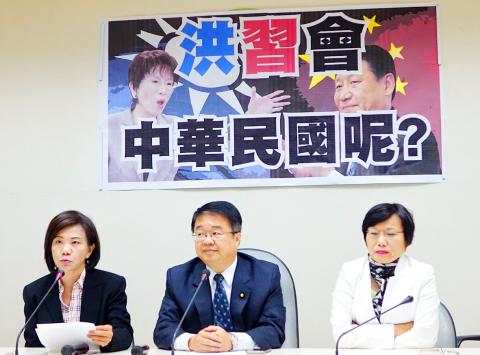Chinese Nationalist Party (KMT) Chairwoman Hung Hsiu-chu (洪秀柱) failed to defend the nation’s sovereignty by not mentioning the Republic of China (ROC) in her meeting with Chinese President Xi Jinping (習近平) in Beijing on Tuesday, the Democratic Progressive Party (DPP) caucus said yesterday, adding that the meeting stressed the “one China” framework of the so-called “1992 consensus.”
The existence of the ROC was again omitted from the annual get-togther between the KMT and the Chinese Communist Party (CCP), as Xi reiterated the “one China” principle and Hung left Xi’s statements unchallenged, DPP caucus chief executive Wu Ping-jui (吳秉叡) said.
The KMT has formulated the “1992 consensus” as being “one China, with different interpretations,” but there is never room for the interpretation under China’s assertion of the “one China” principle, Wu said, criticizing Hung for failing to mention the ROC during the meeting.

Photo; Liu Hsin-de, Taipei Times
The “1992 consensus” refers to a supposed tacit understanding between the KMT and the Chinese government that both sides of the Taiwan Strait acknowledge that there is “one China,” with each side having its own interpretation of what “China” means.
Former Mainland Affairs Council chairman Su Chi (蘇起) said in 2006 that he had made up the term in 2000.
Xi did not make specific responses to Hung’s requests at the meeting. At a welcome dinner in Nanjing on Monday, China’s Taiwan Affairs Office Minister Zhang Zhijun (張志軍) said it was difficult for Beijing to make concessions to the eight Taiwanese cities and counties whose government leaders made a visit to China in September to seek tourism and business opportunities under the “1992 consensus.”
“It shows that the ‘1992 consensus’ and cross-strait interactions preconditioned by the ‘consensus’ are not a cure-all,” Wu said. “Groveling [to China] will not ensure any gain.”
Hung mentioned the ROC during a visit to the mausoleum of ROC founder Sun Yat-sen (孫逸仙) in Nanjing on Monday, but the ROC, as the nation’s official title that represents a democracy of 23 million people, was missing throughout the rest of Hung’s trip to China, DPP Legislator Yeh Yi-jin (葉宜津) said.
“To normalize interaction, the ROC’s existence and Taiwan’s values of democracy, freedom and human rights have to be recognized,” Yeh said.
China also barred reporters from three Taiwanese media organizations from attending the Hung-Xi meeting, but Hung regrettably did not make any comment about freedom of the press, Yeh added.
Meanwhile, Hung’s proposal of a peace accord and the mentioning of the KMT’s “peace-centered policy platform” were an apparent attempt to seek an alliance with the CPP against the DPP, as the policy platform was formed in opposition to the DPP’s independence platform, DPP Legislator Tuan Yi-kang (段宜康) said.
“[Hung] does not have to propose a peace platform,” Tuan said. “[She] could have just asked Xi to invade Taiwan.”

DEFENDING DEMOCRACY: Taiwan shares the same values as those that fought in WWII, and nations must unite to halt the expansion of a new authoritarian bloc, Lai said The government yesterday held a commemoration ceremony for Victory in Europe (V-E) Day, joining the rest of the world for the first time to mark the anniversary of the end of World War II in Europe. Taiwan honoring V-E Day signifies “our growing connections with the international community,” President William Lai (賴清德) said at a reception in Taipei on the 80th anniversary of V-E Day. One of the major lessons of World War II is that “authoritarianism and aggression lead only to slaughter, tragedy and greater inequality,” Lai said. Even more importantly, the war also taught people that “those who cherish peace cannot

STEADFAST FRIEND: The bills encourage increased Taiwan-US engagement and address China’s distortion of UN Resolution 2758 to isolate Taiwan internationally The Presidential Office yesterday thanked the US House of Representatives for unanimously passing two Taiwan-related bills highlighting its solid support for Taiwan’s democracy and global participation, and for deepening bilateral relations. One of the bills, the Taiwan Assurance Implementation Act, requires the US Department of State to periodically review its guidelines for engagement with Taiwan, and report to the US Congress on the guidelines and plans to lift self-imposed limitations on US-Taiwan engagement. The other bill is the Taiwan International Solidarity Act, which clarifies that UN Resolution 2758 does not address the issue of the representation of Taiwan or its people in

US Indo-Pacific Commander Admiral Samuel Paparo on Friday expressed concern over the rate at which China is diversifying its military exercises, the Financial Times (FT) reported on Saturday. “The rates of change on the depth and breadth of their exercises is the one non-linear effect that I’ve seen in the last year that wakes me up at night or keeps me up at night,” Paparo was quoted by FT as saying while attending the annual Sedona Forum at the McCain Institute in Arizona. Paparo also expressed concern over the speed with which China was expanding its military. While the US

‘FALLACY’: Xi’s assertions that Taiwan was given to the PRC after WWII confused right and wrong, and were contrary to the facts, the Ministry of Foreign Affairs said The Ministry of Foreign Affairs yesterday called Chinese President Xi Jinping’s (習近平) claim that China historically has sovereignty over Taiwan “deceptive” and “contrary to the facts.” In an article published on Wednesday in the Russian state-run Rossiyskaya Gazeta, Xi said that this year not only marks 80 years since the end of World War II and the founding of the UN, but also “Taiwan’s restoration to China.” “A series of instruments with legal effect under international law, including the Cairo Declaration and the Potsdam Declaration have affirmed China’s sovereignty over Taiwan,” Xi wrote. “The historical and legal fact” of these documents, as well